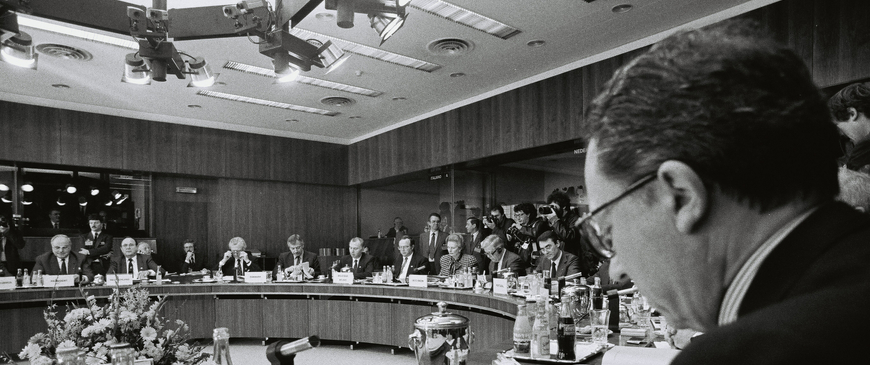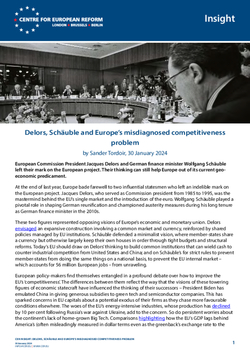
Delors, Schäuble and Europe's misdiagnosed competitiveness problem
European Commission President Jacques Delors and German finance minister Wolfgang Schäuble left their mark on the European project. Their thinking can still help Europe out of its current geo-economic predicament.
At the end of last year, Europe bade farewell to two influential statesmen who left an indelible mark on the European project. Jacques Delors, who served as Commission president from 1985 to 1995, was the mastermind behind the EU’s single market and the introduction of the euro. Wolfgang Schäuble played a pivotal role in shaping German reunification and championed austerity measures during his long tenure as German finance minister in the 2010s.
These two figures represented opposing visions of Europe’s economic and monetary union. Delors envisaged an expansive construction involving a common market and currency, reinforced by shared policies managed by EU institutions. Schäuble defended a minimalist vision, where member-states share a currency but otherwise largely keep their own houses in order through tight budgets and structural reforms. Today’s EU should draw on Delors’ thinking to build common institutions that can wield cash to counter industrial competition from United States and China; and on Schäuble’s for strict rules to prevent member-states from doing the same things on a national basis, to prevent the EU internal market – which accounts for 56 million European jobs – from unraveling.
European policy-makers find themselves entangled in a profound debate over how to improve the EU’s ‘competitiveness’. The differences between them reflect the way that the visions of these towering figures of economic statecraft have influenced the thinking of their successors – President Biden has emulated China in giving generous subsidies to green tech and semiconductor companies. This has sparked concerns in EU capitals about a potential exodus of their firms as they chase more favourable conditions elsewhere. The woes of the EU's energy-intensive industries, whose production has declined by 10 per cent following Russia's war against Ukraine, add to the concern. So do persistent worries about the continent's lack of home-grown Big Tech. Comparisons highlighting how the EU's GDP lags behind America’s (often misleadingly measured in dollar terms even as the greenback's exchange rate to the euro hovers near decade-highs) have fostered an atmosphere bordering on panic among EU economic policy-makers.
In keeping with the spirit of Delors, the EU is embracing industrial policy to contend with the mercantilist strategies of China and the US. It is doing it largely at a national level, however. The EU has relaxed constraints on national state aid, allowing rich member-states to splurge on counter-subsidies for companies considering investments in the US. Meanwhile, Commission President von der Leyen’s proposed fund for common EU industrial state aid, which was meant to provide an EU-level instrument to counter the US Inflation Reduction Act, came to nothing. Combining Delors’ market-building interventionism with Schäuble’s dislike for EU level financing has created a sort of Frankenstein’s monster. As a result, there is now a subsidies race between member-states, in which larger or deeper-pocketed countries outspend the others. This undermines the level playing field between firms in the European market – key for competition and innovation – and threatens to disrupt European political cohesion. In an ironic illustration of these fissures, the presidents of the Commission and European Council have each appointed their own intellectual champion in the form of two different former centrist Italian prime ministers – Enrico Letta for Council president Charles Michel; Mario Draghi for Commission President von der Leyen – to write a report on the EU’s ‘competitiveness’ challenge.
Combining Delors' market-building interventionism with Schäuble’s dislike for EU level financing has created a sort of Frankenstein’s monster of EU economic policy.
Coming up with a focused and consistent diagnosis of the EU’s economic ailments rather than an array of perceived problems under the banner of ‘competitiveness’ should be Draghi and Letta’s priority. Delors and Schäuble both had clear diagnoses of the problems of their time – whether you agreed with them or not. For Delors, an integrated European market and shared currency was a response to ‘eurosclerosis’ (the failure of the EU system to take significant integrating steps in the 1980s), sluggish growth, and the disruptive devaluations of individual European currencies in the 1970s. Schäuble attributed the euro crisis of the 2010s to the profligacy of certain member-states following the euro’s introduction. The imperative for Draghi and Letta is to articulate a similarly clear and precise diagnosis tailored to the current economic landscape.
The problem is that it is unclear what Europe’s competitiveness problem is all about. Traditionally, lack of competitiveness describes a country living beyond its means, marked by excessive imports, overspending, and sizable budget deficits – a narrative reminiscent of the euro crisis. But this framework does not capture the EU’s situation. The EU and the eurozone’s trade surpluses are roaring back after the jump in the cost of energy imports recedes. Fiscal deficits are smaller than in the US, and in green tech, the EU is outpacing the US, with nearly twice the market share of global exports by the end of 2022. Even in terms of economic growth, many EU member-states have kept pace with the US since the pandemic.
So what are the real challenges? One prime candidate for an existential threat to the EU's economic model emerges from its heavy reliance on external demand for its products, particularly from China and the US. This dependency has become a weakness amid the backdrop of geopolitical disorder and rising protectionism. The EU's vulnerability is heightened by its reliance on imported energy from the Middle East and semiconductors from Taiwan – both in areas threatened by actual or potential conflicts.
In an environment where the EU cannot count on demand from abroad, a dose of Schäuble’s preferred medicine would backfire. Cutting budgets and repressing wages to keep EU products cheap would merely choke domestic demand out of the eurozone economy, and tip it into a deeper slump. But embracing a Delors-type vision of completing the single market in its current guise also risks misfiring. If Draghi or Letta call for improving the cross-border flow of services or capital it would be largely ignored because these projects have been stalled for years. Member-states disagree on how to take the banking and capital markets union forward, and they still retain barriers to European competition to protect services sectors and regulated professions within their markets.
The real answer is that to protect European workers from shocks from Sino-American trade wars, the EU must learn the language of macro-economic demand management, not only of market integration or regulation, let alone ‘competitiveness’.
The EU’s construct of trade openness and strict competition law gives Europe strengths in trade intensity (a larger share of GDP being exposed to trade) and an ability to direct global standards. But the EU lacks the legal instruments and common pots of money to stand up to the US and China where it must. For example, screening foreign investment or export controls – economic weapons in Beijing and Washington’s arsenal – remain largely national competences in Europe. As a result, the superpowers time and again simply lean on individual member-states to get the EU to fracture.
This dynamic has been on display for years. Chinese firms were allowed to build 5G telecoms infrastructure in one country, but not another, or to take stakes in the port of Piraeus and Rotterdam while concerns were raised about Hamburg. It was also evident when the US cajoled the Netherlands into stopping exports of cutting-edge chip-making machinery to China, which it could do because it is largely a national decision. If the US had been negotiating with the EU as a bloc, it is possible the EU could have struck a more strategic bargain. It could for example have got the US to help guarantee future European access to chip technology from the US itself but also Japan, Taiwan and South Korea, each of whom are home to firms that dominate certain parts of the value chain.
The EU has launched an economic security strategy and new tools like an anti-coercion instrument. These are welcome steps. But other pieces of the toolkit, including foreign investment screening, export controls and industrial policy, remain largely national. The ‘European sovereignty fund’ – an EU pot which was supposed to help Europe compete with the hundreds of billions of dollars that the US and China are splashing out in subsidies – is now a very modest redirection of existing EU funds. The Commission also gave it an eminently forgettable new name, the ‘Strategic Technologies for Europe Platform’. Building an EU-level toolkit to protect Europeans from geopolitical economic conflict remains an urgent task.
Delors and Schäuble left their mark on the European project, but their single market or cost competitiveness philosophies cannot resolve Europe’s current geopolitical predicament. But their institutional thinking might.
Draghi and Letta have been asked to address a competitiveness problem Europe does not have. The EU has a trade surplus and runs comparatively tighter budgets than China or the US. Rather than giving preferential treatment to countries, sectors or firms, Europe’s best shot at economic dynamism is to create institutional structures that harness the scale and potential of Europe’s markets while managing their excesses. In different ways, that was a key tenet of both Delors and Schäuble’s thinking. The EU should certainly not respond to superpower competition by eroding its common market from within. Instead, the EU should storm-proof the house that Jacques and Wolfgang built with a covering of demand-management and international economic policy.
Sander Tordoir is senior economist at the Centre for European Refrom.


Add new comment